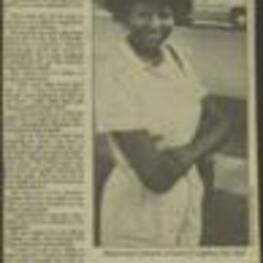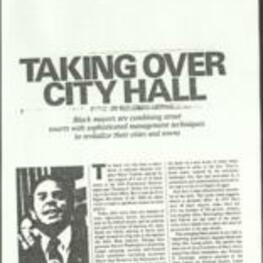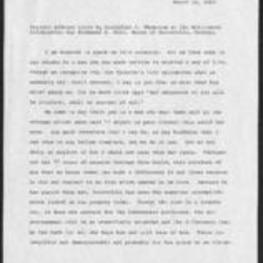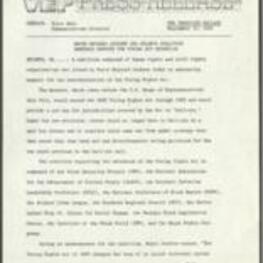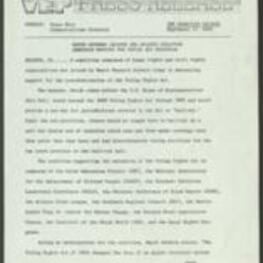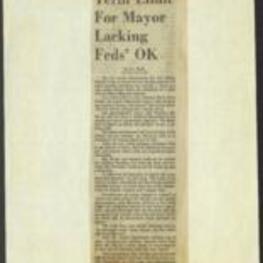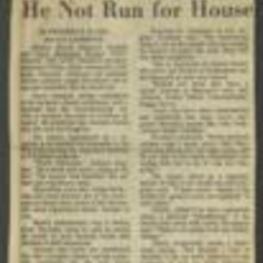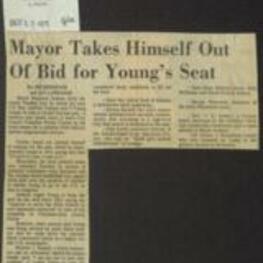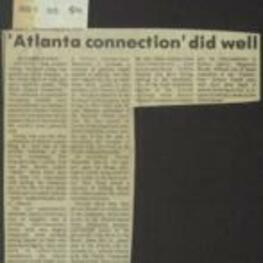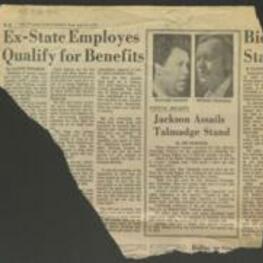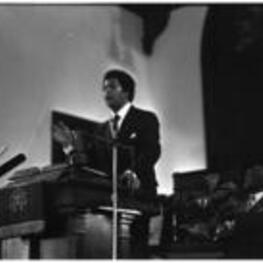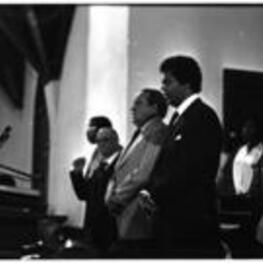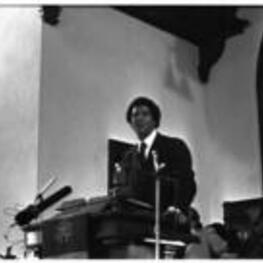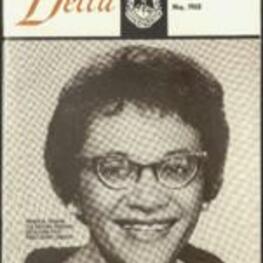1984
Renita Jimmar, a 23-year-old supervisor for American Telephone and Telegraph, became Leighton's first Black mayor-elect after winning the July 10 election with 230 votes, defeating the incumbent Eugene Boatwright, and plans to work on improving the town's recreational facilities for young people and obtaining federal funds for housing, water, and sewer improvements. 1 page.
African American mayors, African Americans--Social conditions, Voting, African Americans--Civil rights
Voter Education Project Organizational Records
1983-06
Article from Black Enterprise on how Black Mayors are revitalizing cities and towns. Mayors discussed are Andrew Young, Coleman Yound, and Johnny Ford, accompanied by a full list around the country. 8 pages.
African American business enterprises, African American mayors
Voter Education Project Organizational Records
1983-03-12
Keynote address given by Geraldine G. Thompson at the retirement celebration for Richmond D. Hill, mayor of Greenville, Georgia.
Speeches, African American civic leaders, African American mayors
Voter Education Project Organizational Records
1983-02-21
Article on Richmond Hill, the first Black mayor in Georgia retiring at the age of 77, leaving behind a successful career that began with him working as a bellhop at an Atlanta hotel. 1 page.
African Americans--Georgia--Atlanta, African American mayors, Political participation
Voter Education Project Organizational Records
1981-09-17
Press release on a coalition of civil rights organizations was joined by Atlanta Mayor Maynard Jackson in announcing support for the reauthorization of the Voting Rights Act, which would extend the Act through 1992 and provide a new way for jurisdictions covered by the Act to "bail-out" if they can prove they have not had discriminatory voting practices for the ten years before the bail-out suit. 2 pages.
African American mayors, African Americans--Politics and government, African Americans--Civil rights, African American women, African American civic leaders, African American civil rights workers
Voter Education Project Organizational Records
1981-09-17
Press release from the Voter Education Project discussing a coalition of human rights and civil rights organizations', along with Mayor Maynard Jackson, calls for the reauthorization of the Voting Rights Act. Their proposed measure would extend the Act through 1992 and provide a new way for jurisdictions covered by the Act to "bail-out." The coalition urged citizens to contact their Congresspersons and encourage them to support the measure. 2 pages.
African American civic leaders, African Americans--Civil rights, Voter registration, African Americans--Politics and government, African American mayors
Voter Education Project Organizational Records
1981-03-20
Newspaper article on the U.S. Justice Department's informing of Atlanta officials that it had no record of ever having approved the city's two-term limitation for mayor, meaning that the city would likely have to resubmit their charter for approval and that the two-term limit would possibly not be legally enforceable. Mayor Maynard Jackson had previously stated that he would not seek a third term, but this ruling offered the potential to reopen the debate. 1 page.
African American civic leaders, African Americans--Civil rights, African American mayors, African Americans--Politics and government
Voter Education Project Organizational Records
1976-12-18
Newspaper article describing Atlanta Mayor Maynard Jackson and Voter Education Project (VEP) Director John R. Lewis's plans to run for Congress. Jackson's top political advisor urged him not to run, but Jackson had not made an official decision yet. Lewis also had not made a decision, but he was encouraged by many people to run. State Rep. Mildred Glover was also expected to enter the race. She stated earlier that she did not want to run against Jackson, but she had since changed her mind. 1 page.
Political campaigns, African American civic leaders, African Americans--Civil rights, Voter registration, African Americans--Politics and government, African American mayors
Voter Education Project Organizational Records
1976-12-15
Article about Atlanta Mayor Maynard Jackson announcing that he would not seek US Rep. Andrew Young's seat in the event that Young resigns to take a United Nations post, leaving City Council President Wyche Fowler as a potential front-runner for a possible Fifth District special congressional election.
African American mayors, African Americans--Politics and government
Voter Education Project Organizational Records
1976-11-06
This article describes the influential role that Rep. Andrew Young and the "Black Atlanta Connection" played in securing Jimmy Carter's election as President of the United States, with prominent Georgians and other figures supporting Carter's campaign through their political power, personal integrity, and outreach efforts to African American communities. 2 pages.
Voter registration, Voting, Political participation, African American civic leaders, African American mayors
Voter Education Project Organizational Records
1975-07-16
Newspaper article describing Mayor Maynard Jackson of Atlanta criticism of U.S. Sen. Herman Talmadge for opposing the extension of the Voting Rights Act of 1965. Jackson stated that the act was still needed to protect the right to vote for black people in Georgia. Jackson said that Talmadge was "ignorant" of the facts when he claimed that Black people enjoyed universal voter registration rights. He pointed to the fact that there were continuing violations of the Voting Rights Act in Georgia. 1 page.
African American civic leaders, African Americans--Civil rights, Voter registration, African Americans--Politics and government, Political campaigns, African American mayors
Voter Education Project Organizational Records
1972/1976
Maynard Jackson addresses people in a church.
African American civic leaders, African Americans--Civil rights, African American leadership, Civil rights movements, African American churches, African American mayors
Voter Education Project Organizational Records
1972/1976
Maynard Jackson sings along with other people at a church.
African American civic leaders, African Americans--Civil rights, African American leadership, Civil rights movements, African American churches, African American mayors
Voter Education Project Organizational Records
1972/1976
Maynard Jackson speaks to people in a church.
African American civic leaders, African Americans--Civil rights, African American leadership, Civil rights movements, African American churches, African American mayors
Voter Education Project Organizational Records
1968-05
The Delta Vol. 54 No. 11 monthly publication from Delta Sigma Theta Sorority, Inc. with articles about Black Power, 1967 convention, Delta Teen-Lift, and additional program information. 87 pages.
African Americans--Civil rights, African American women's suffrage, Women's rights, African Americans--Politics and government, African American women, Women--Societies and clubs, African American mayors, Greek letter societies
Voter Education Project Organizational Records


